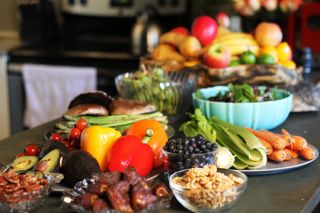
Diet
A Food Psychologist's Take on the Paleo Diet
What's all the Hype about Paleo?
Posted August 16, 2013
You’ve probably heard of The Paleo Diet by now. Created by Loren Cordain, PhD, the diet advocates that weight control is merely a function of eating as our ancestors would have back in the Paleolithic era (2.6 million years ago up to about 10,000 years ago). This includes meat, fish, fruits, vegetables, seeds, nuts, and oils. Dairy products, grains, legumes, sugar and processed foods are off the menu as they weren’t around back then. Cordain argues that more than 70% of what we currently eat comes from foods that our bodies were not designed to handle (e.g., dairy). As a result, excessive consumption of these relatively “new” foods is making us sick and obese.
But what’s the evidence for the effectiveness of this diet? Is there anything from our biology that would support this theory? As it turns out, yes. And no.
The Paleo Diet advocates that if we eat whole foods from the food groups our hunter-gatherer ancestors would have thrived on we’ll be healthy. To that end, Cordain has a point. Yes, whole foods are preferred by our bodies and are more likely to keep us healthy than are processed foods. However, let’s think about what life was like on the savannah 10,000 years ago.
Imagine that you’re Paleo Man (or Woman). You live with a small nomadic group of other Paleo men and women. As McDonald’s doesn’t exist yet, you have to forage and hunt for your food. You have primitive tools to help you hunt, which is great. What you don’t have is air conditioning or central heat. And the temperature fluctuates between very hot and very cold. The hot weather wasn’t too bad as plants like heat, as do some animals. But the cold was very bad. There were no plants to harvest and many of the animals bedded down for winter, so you had to subsist on what you were able to store from your summer foraging efforts as well as whatever game you could find in the winter months. As a result, you tended to eat more than you needed to during the summer months to help you store fat to get you through the leaner times of the winter months. Not only was this a practical strategy, but your body actually encouraged you to do this.That is, your genes are programmed to encourage you to eat more in times of plenty to help you get through times of famine. While that genetic programming worked great for Paleo Man, we have McDonalds and plenty of food – more than we need. But our bodies still think that we should eat all of it just in case that famine comes.
Which gets us back to our question – is Loren Cordainright? Are we obese because of our Modern Diet? To some extent, yes. Would we benefit from the Paleo Diet? Initially, yes – it would be getting us away from all of that processed food and back to whole foods like lean protein, fruits, and veggies. That being said, the Paleo Diet does not meet all of our modern nutritional needs. Most experts recommended that those on the Paleo Diet supplement with vitamins and minerals, essential fatty acids, and probiotics (bacteria that help maintain the natural balance of organisms (microflora) in the intestines – it’s not as gross as it sounds, I promise!). Nutritionists also caution that the Paleo Diet may be too high in protein for some individuals and contain food recommendations that may cause allergic reactions in some (e.g., peanuts). Finally, Cordain recommends a diet very high in animal fat, which is not advised by modern nutritionists, and he recommends that we don’t eat grains. Recent evidence indicates that wild grasses providing seeds and grains emerged 65 to 55 million years ago and our ancestors likely ate them when they were available as they provided fiber and other nutrients found only in plants. Thus, Cordain’s assertion that we should avoid grains based on what our ancestors ate may not be valid. Regardless of whether Paleo Man ate grains or not, most modern nutritionists believe that avoiding grains is not a healthy or viable option, as long as the grains are whole and unprocessed.

So where does that leave us? Should you do the Paleo Diet? If it gets you off of processed foods, you might give it a try in the short term. It's probably not worth doing over the long haul, though, as it has too much fat and protein and too little carbohydrates (especially whole grains) to be practical or healthy for most people. However, a combination of the Paleo and Mediterranean Diets has shown some merit.
Bottom line: most modern nutritionists blame our unhealthy diet for our weight management issues as the types of foods we are eating interfere with our body’s ability to recognize when we are hungry and when we are full. Evidence suggests that cutting down on processed foods – especially refined grains and sugars – would help tremendously in our path to healthy weight loss and maintenance. That's something this food psychologist and holistic health coach is happy to advise!

